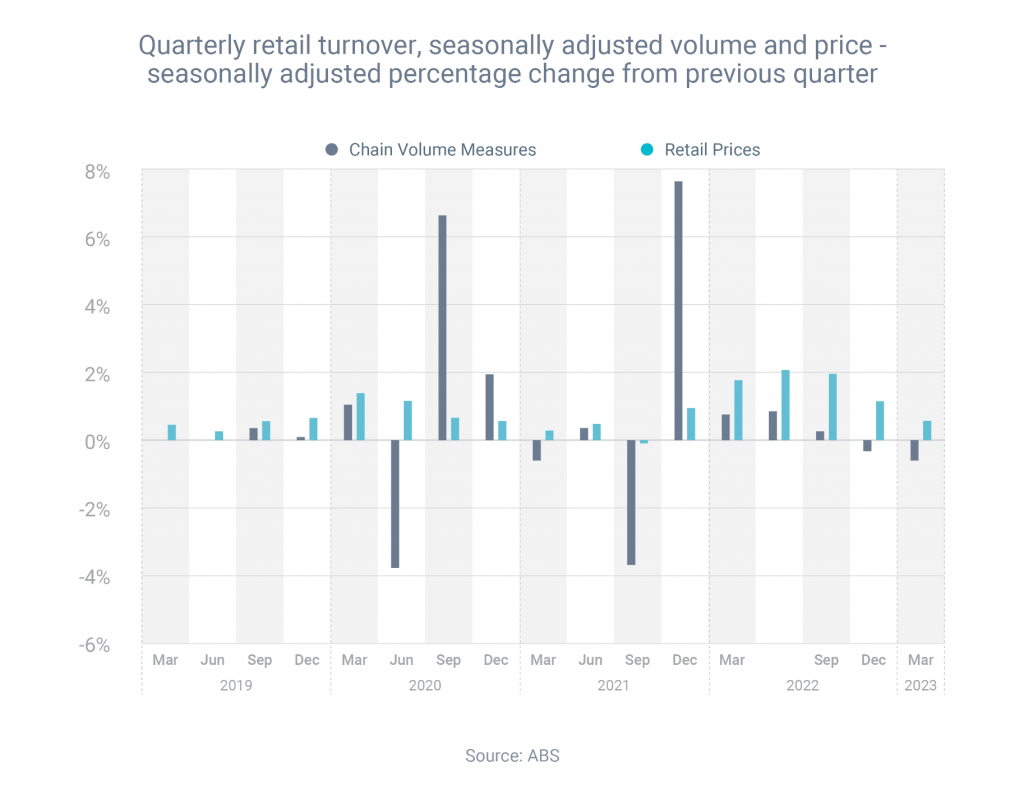Rateseeker Business News Round-up May 2023

With the economy in a state of transition, the biggest news this month are cut from the same cloth in the business and finance world.
According to recent data from the Australian Bureau of Statistics, retailers are recording higher revenues, yet making fewer sales. These results indicate that higher prices are being charged to achieve this.
The instant asset write-off has been continued for another year, under revised conditions announced in the recent federal budget. Small businesses with aggregated annual turnover of less than $10 million will soon be able to immediately deduct the full cost of eligible assets costing less than $20,000 that are first used or installed ready for use in the 2023-24 financial year.
The Australian government states that as inflation falls, the price growth has peaked. In March the annual inflation rate was 6.3% – which would’ve been a high number in the recent past but is now reasonably positive news as it marked the third consecutive monthly decline in inflation from the 8.4% recorded in December – which appears to have been the peak.
Aussies have spoken, and they want cleaner, greener homes and vehicles.
According to research commissioned by The Australia Institute, consumers feel positive about moving to full electrification and reducing the nation’s carbon footprint, leading to a positive steps for a cleaner Australia.
Retail sales volumes fall as consumers purchase less

Recent data from the Australian Bureau of Statistics reveals that retailers are reporting higher revenues, however making fewer sales.
Retail sales turnover fell to $34.4 billion in December of last year, then jumped to $35.1 billion in January, $35.2 billion in February and $35.3 billion in March.
However, sales volumes actually fell 0.6% during the same quarter.
The reason for the apparent discrepancy is because prices simultaneously rose 0.6% over those three months, which means retailers earned more revenue not because they made more sales but because they charged higher prices.

In a peculiar move, Australia’s inflation rate increased by 1.4% during the March quarter, which means retail prices actually rose at below-inflation rates.
ABS head of retail statistics Ben Dorber said the growth in retail prices during the March quarter was the slowest since September 2021.
“The slowdown in price growth was mainly due to discounts on clothing and large household items such as furniture and electronic goods, while food retailing prices continue rising,”
The slowdown in price growth was mainly due to discounts on clothing and large household items such as furniture and electronic goods, while food retailing prices continue rising.
Ben Dorber – ABS Head Of Retail Statistics
Instant asset write-off threshold adjusted to $20k

The instant asset write-off has been continued for another year, however under revised conditions announced in the recent federal budget.
From 1 July 2023 to 30 June 2024, small businesses with aggregated annual turnover of less than $10 million will be able to immediately deduct the full cost of eligible assets costing less than $20,000 that are first used or installed ready for use in the 2023-24 financial year.
According to the budget papers, the $20,000 threshold will apply on a per asset basis, so small businesses can instantly write off multiple assets.
Assets valued at $20,000 or more (which cannot be immediately deducted) can continue to be placed into the small business simplified depreciation pool and depreciated at 15% in the first income year and 30% each income year thereafter.
The provisions that prevent small businesses from re-entering the simplified depreciation regime for five years if they opt-out will continue to be suspended until 30 June 2024.
Previously, the instant asset write-off threshold was $150,000 rather than $20,000.
Need a business loan? Get in touch with our team today and find out how we can help your business grow.
Price growth peak and inflation falling says government

The annual inflation rate in March was 6.3% – which would’ve been a high number in the recent past but is now reasonably positive news.
This is mainly due to the third consecutive monthly decline in inflation from the 8.4% recorded in December – which suggests to have been the peak.
Some categories however, are making an outsized contribution to inflation. For example, electricity prices rose 15.7% in the year to March and bread & cereal products 10.8%. On the other hand, communications prices rose only 1.2%, while automotive fuel prices actually fell 8.2%.
In the recent budget, the federal government said that inflation had peaked in late 2022 and was expected to fall to between 2% and 3% during the 2024-25 financial year.
The global price shocks and supply constraints that contributed to the large increase in inflation over the past year are easing.
There is no evidence of a wage-price cycle developing and inflation expectations remain well-anchored.
– The Federal Government
Aussie survey shows we want cleaner, greener homes and vehicles

New research commissioned by The Australia Institute reveals that Aussie consumers feel positive about moving to full electrification and reducing the nation’s carbon footprint for a more sustainable future.
Key findings from the survey were:
- 65% feel positive about the transition to renewables with 15% negative
- 55% feel positive about electrifying more homes with 13% negative
- 53% feel positive about the federal government’s plan to reach net zero by 2050 with 19% negative
- 45% feel positive about the transition to electric vehicles with 26% negative
The Australia Institute’s director for South Australia, Noah Schultz-Byard, said consumers are eager to switch on cheaper, cleaner energy at home and in their vehicles.
“From space heating to cooktops, Australians prefer electric over gas for every appliance type listed in our survey. This research has also revealed the declining popularity of petrol and diesel cars in Australia, as they are now the least preferred option behind both hybrid and electric alternatives,” he said.
“With electric technology now readily available, the biggest barrier to making that switch is the upfront cost of transition. This is where the government could come in and support those families who want to go electric.”
From space heating to cooktops, Australians prefer electric over gas for every appliance type listed in our survey. This research has also revealed the declining popularity of petrol and diesel cars in Australia, as they are now the least preferred option behind both hybrid and electric alternatives.
With electric technology now readily available, the biggest barrier to making that switch is the upfront cost of transition. This is where the government could come in and support those families who want to go electric.
Noah Schultz-Byard – SA Director The Australia Institute
** General Advice Warning
The information provided on this website is general in nature only and it does not take into account your personal needs or circumstances into consideration. Before acting on any advice, you should consider whether the information is appropriate to your needs and where appropriate, seek professional advice in relation to legal, financial, taxation, mortgage or other advice.




